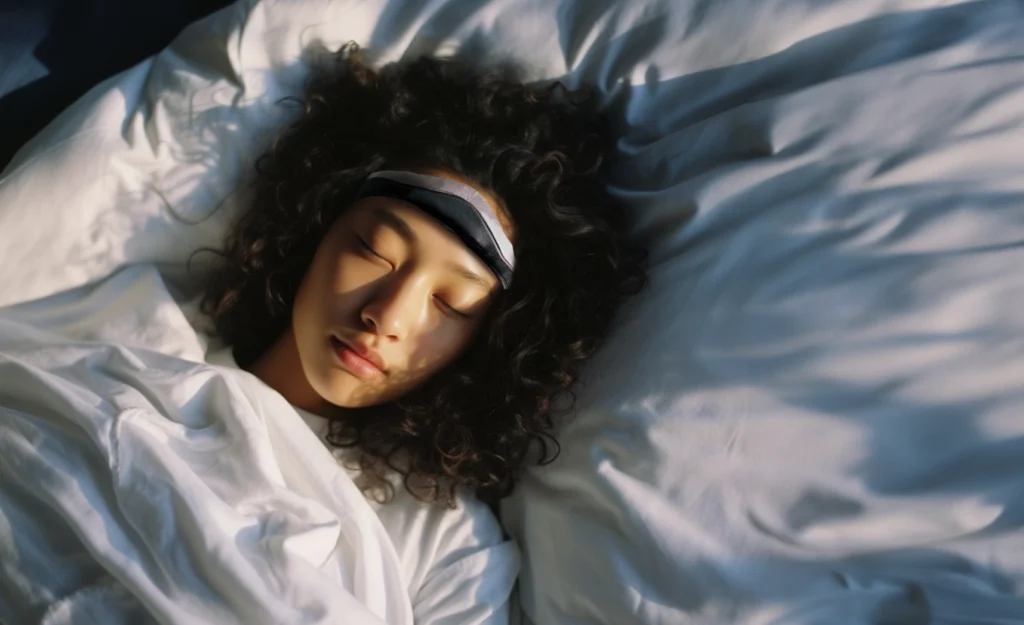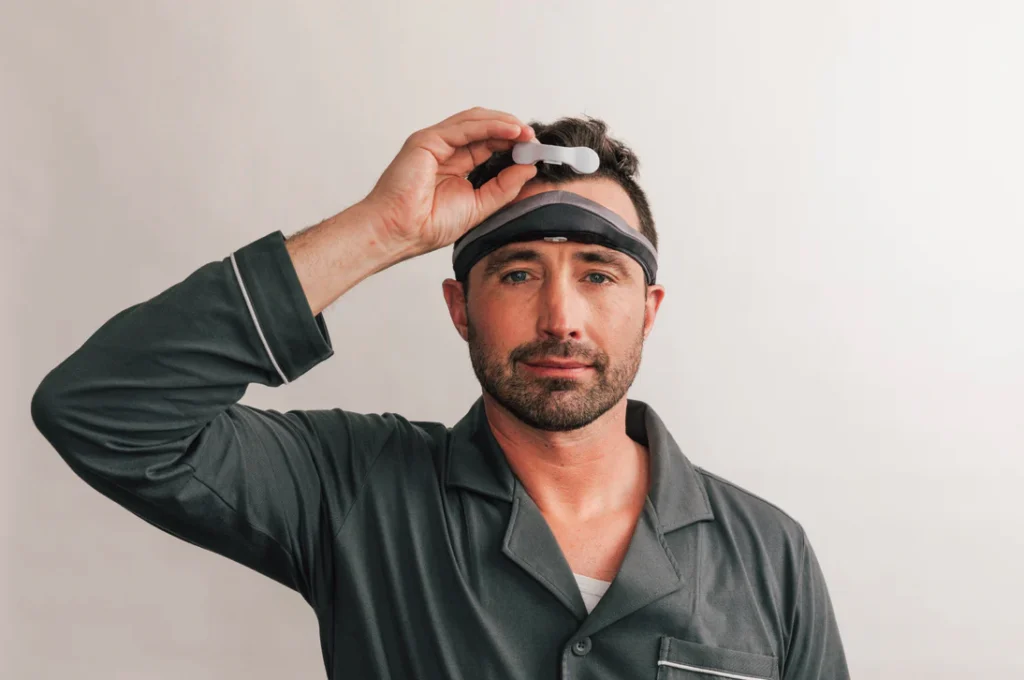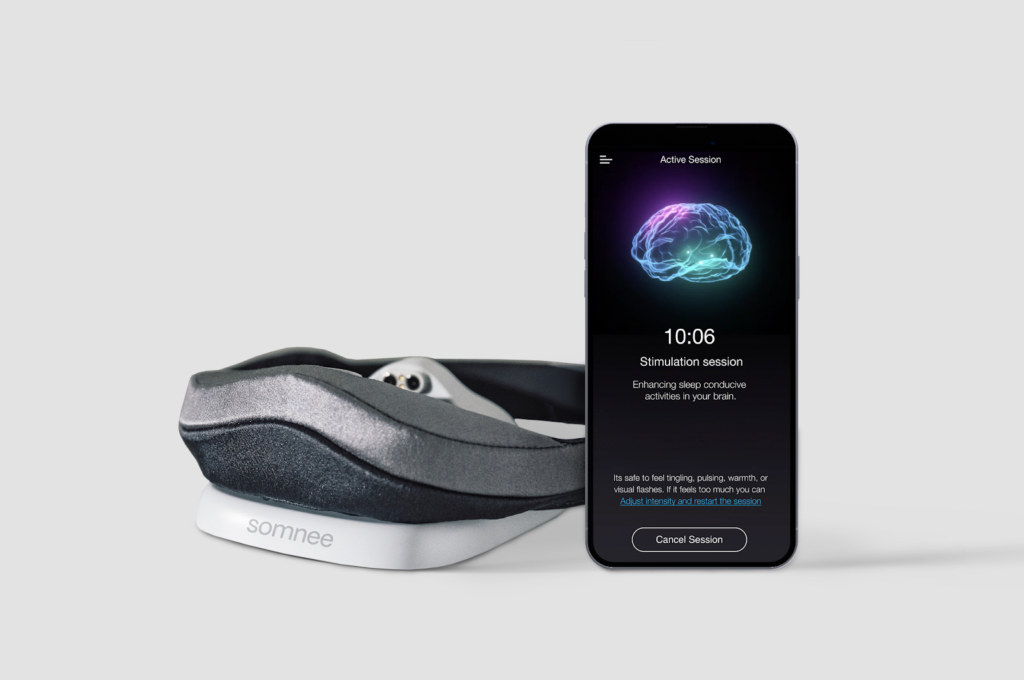CEO Corner: Somnee’s Tim Rosa on Sleep Science, NBA Launchpad

Makers of a sleep headband created by neuroscientists, Somnee will work with the NBA to explore the link between sleep and player performance
Sleep is becoming big business. From wearable tech to smart mattresses to luxury hotel offerings, companies of all sizes are entering the race to help people sleep better for longer, pushing the global sleep market to a projected $950 billion by 2032, per Emergen Research.
The NBA is getting on board, too, choosing sleep wearable maker Somnee as part of its 2025 NBA Launchpad cohort, the basketball league’s “Shark Tank”-style program that puts a spotlight on emerging technologies.
Founded by a team of neuroscientists including University of California, Berkeley, professor and social media personality Dr. Matt Walker, Somnee makes a sleep headband that uses EEG sensors to help people fall asleep faster, sleep longer and improve their sleep quality.
In late 2023, the company hired former Fitbit chief marketing officer Tim Rosa as its CEO, counting on Rosa to build Somnee into the next big wearable brand.
Rosa sat down with Athletech News to discuss Somnee’s new partnership with the NBA and how the brand is using wearable tech to revolutionize the way people around the world sleep.
The following conversation has been lightly edited for clarity and length.
Athletech News: Can you tell us about your background and why you decided to join Somnee in 2023?
Tim Rosa: I started my career on the brand side and then got recruited over to Sega Sports and ESPN Video Games to run sports marketing. After we got acquired, I launched the 2K Sports brand. NBA 2K was my baby, and we grew it from under 7% market share to 100% market share in five years. From there, I ended up at Electronic Arts and EA Sports. I then joined a tiny startup called Fitbit. We grew Fitbit from the U.S. to 100 countries, selling around 140 million units during my 10 years there and doing the biggest IPO in history for a consumer electronics company. We ultimately sold to Google.
I then took some time off, when I got a call from Vinod Khosla of Khosla Ventures and Dr Matt Walker – probably the most famous sleep scientist in the world – who’s the co-founder of Somnee. They called about a CEO opportunity. I actually struggled with adult insomnia – I was taking THC and CBD edibles to help me fall asleep, which I’ve since learned are bad. I said, “Look, I don’t know that much about (sleep science). But if this thing works, I’ll be open to it.” During my third Somnee session, I fell asleep with it on.

ATN: What have your early priorities been since taking over as Somnee’s CEO?
TR: I’m deeply passionate about consumer experiences. Our gen-one product is great, and the technology is amazing, but it looked like a bunch of engineers and scientists had assembled it for a “Star Trek” episode. It was scientists speaking to scientists. I said, let me relaunch the brand, because we have the opportunity to scale to general population consumers. We’ll be rolling out some new products this year. I can’t talk about it in too much detail yet, but it’ll be a game-changer for the category.
ATN: At a high level, how does Somnee help people get better sleep?
TR: We’re like a sleep lab for the bedroom. We’re taking the technology that Dr. Matt Walker and our scientists use at UC Berkeley, and we’ve miniaturized it into a product that not only helps with sleep onset, but helps with sleep maintenance as well as overall quality.
We use what we call EEG-plus, which essentially maps your brain, because every brain is different. What we’re trying to do is figure out each individual’s optimal state for sleep. That takes about 21 sessions because there are different stages: mapping, personalization and optimization (adaptive). By the end of that, we’re affecting your ability to fall asleep, your ability to stay asleep and your overall quality of sleep. So it’s a unique product, and pretty groundbreaking.

ATN: What was it like to be selected as part of the NBA Launchpad program?
TR: I have an almost 20-year relationship with the NBA (dating back to Rosa’s time in video games). When I was at Fitbit, I brokered one of the very first jersey patch deals with the Minnesota Timberwolves. It was an awesome partnership and relationship. During that time, I met (NBA executive) Tom Ryan. He reached out to me a few months ago and said, “Hey, I love what you’re doing at Somnee. Would you be open to participating in this?”
But it wasn’t something they just gave us. We had to make a “Shark Tank”-like pitch in front of the chief medical officers and trainers for the NBA, G League and WNBA, along with executives and team representatives. It was really important to them that the science was there. Obviously, we have four of the most famous neuroscientists in the world who founded the company, so there’s a lot of respect that already comes with that. But (the NBA) looked at our clinical data and our product roadmap. They love the new products and how those are being positioned. We’ll now do a six-month pilot study with the NBA. Assuming all goes well – we’re confident the results will be good – Somnee will go to referees, coaches, training staff and players across the NBA, WNBA and G League.
ATN: What does partnering with the NBA mean for Somnee – and for the future of sleep science?
TR: It’s a great validation for us. But the reality is that our mission goes beyond sports. We’re trying to affect sleep fitness at every level with everyone from athletes to shift workers to what we call performance-optimizers. So we’re going to go after much bigger population sizes than just elite athletes.
I also think it speaks to the importance and impact of sleep. Sleep is a superpower, as Matt says. It affects your mental health, general health and physical health. There’s a ton of research around sleep and athletic performance, so the league, agents and players are becoming wise to the importance of quality sleep.
There’s research showing that sleep can improve sprint times (by 4.3%) and shooting accuracy by almost 10%. Andre Iguodala during his championship season (in 2014-15) had a huge improvement – decreased turnovers, improved shooting accuracy and points per minute – when he went from sleeping less than seven hours a night to over eight hours a night. A product like Somnee is great, especially for athletes in leagues like the NBA and MLB who travel between time zones, which throws off your circadian rhythm.

ATN: Looking ahead, what’s your vision for the future of Somnee?
TR: Rolling out the best products that the sleep category has ever seen – and consumers in general have ever seen – that actually help them achieve their goal of getting better sleep. I’m really excited about where we’re headed as a company; this is going to be the first of many products that we have in our roadmap. It kind of reminds me of when we started at Fitbit. Then, sitting was the new smoking. Now, not sleeping is the new smoking.



